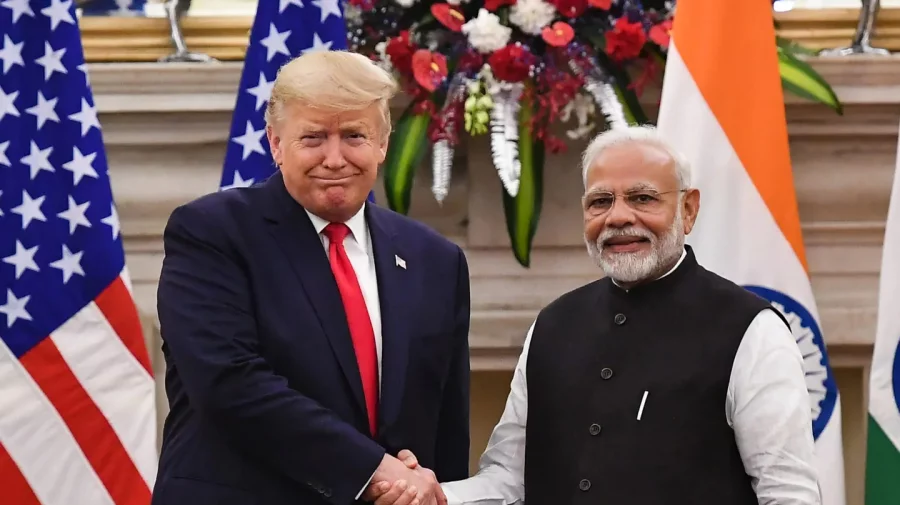International Online Desk
In the war against illegal migrants, the United States deported about 150,000 nationals from different countries in the last six months. While many of these deportees have been detained in a third country, the majority have been repatriated to their home countries.
Among these were 1,700 citizens of India in six months alone. More are expected as the immigration agency in the US continues to haul up illegal migrants. The Indian government has not created a big row over these arrests and deportation even though a good number were seen being hauled in handcuffs. The official statement so far has been that India disapproved of any illegal immigration, blaming human traffickers for such criminal activity.
Parallel to this deportation India sped up its campaign against illegal residents in India and targeted poor Muslim-inhabited areas of a few states such as Gujarat, Rajasthan, and Haryana. They hauled up a good number of Bengali-speaking Muslims who were regular Indian citizens from West Bengal (according to the Indian press) but have been living in those states for years to earn a living.
They were charged as illegal migrants from Bangladesh, brought all the way to the India-Bangladesh border, and pushed out of India, in a way resembling US deportation of illegal Indians from US cities.
Was this a copycat action to show the might of a powerful nation over its weaker neighbour? Or was it a political act by a power-hungry leader to teach lessons to his opponents?
Critics argue that India’s inability to protest against US deportations is counter intuitive to its aspirations for regional hegemony and, consequently, global leadership. A country that nurtures a desire to be an Asian superpower bypassing China should have the courage to protest the indignity with which the US treated its citizens.
Instead, by quietly accepting the indignity with which the deportees were sent back to India, India acknowledged the limits of its muscle-flexing ability. This muscle flexing is reserved for its weaker neighbour, Bangladesh, where it pushed back hundreds of its own citizens under the unproven label of illegal aliens.
The duplicity and diplomatic dissonance shown by the two cases above reveal the asymmetry in India’s global relationship and politics. India has one face in dealing with superpowers, particularly the US, and another with its neighbours. With the US it seeks accommodation to survive, hoping not to upend its strong economic ties, and trying to keep pace with the political tide. With Narendra Modi, it is much more so as he has learned to march to the tune of every US president that he has met.
So, if a president decides to expel Indians as illegals, he does not raise his eyebrow. When the US imposes tariffs, he does not raise a fight. He negotiated coolly. In other words, with a superpower he does not want a fight. The superpowers, particularly the US, are above his league. He kowtows before powers.
Modi’s political calculus is different for Bangladesh.
The objectives of a different approach for smaller neighbours, particularly Bangladesh, are more for domestic than international politics. Modi’s Hindu nationalist party is driven by a desire to dominate politics in every state by drawing Hindu nationalists to one party, the Bharatiya Janata Party (BJP), which has been trying to grow roots in West Bengal, a state with a large Muslim minority.
The ruling Trinamul Party, which has a fairly large Muslim base, has been steadfast in opposing BJP’s Hindutva ideology and its objective to demonize Muslims as anti-state. BJP has been successful in installing a BJP government in Assam, another state with a huge Muslim minority. In fact, BJP’s war against these two states grew from the reliance and support of Muslims to the political parties, Trinamul, and Congress which had ruled Assam before BJP.
The current drive against Muslims is rooted in the controversial Citizenship Amendment Act (2019) that allows citizenship to minorities from all neighbouring states who had emigrated before 2014. It forbids citizenship to Muslims who may have migrated to India that time or before. In essence, any Muslim who is suspected of immigration to India, legal or illegal, prior to 2014 or later is bound by this act to be deported.
India’s inability to push back against US deportation is in stark contrast with the active program of pushing Bengali Muslims into Bangladesh for their alleged Bangladeshi nationality. Critics argue that India is flexing its muscles regionally because its hands are restrained in a global fight, revealing an asymmetric Indian policy. An economically and politically weak Bangladesh has offered little resistance, just as India had to do in the case of US deportation.
To Modi and his government, it does not matter if the people his government is rounding up are legal residents of the state of their residence. It is important to discover where they originally belonged to, or their parents or forefathers belonged to. Any evidence of their origin from Bangladesh or former East Pakistan is proof enough for their deportation. The objective is intimidation of the Muslim minority by forceful eviction of some people from this minority.
It is worthwhile to state here some observations by experts on the above actions. By branding deportations (of alleged Bangladesh nationals) as defense of national interests, Modi is tapping into voter anxiety about identity and sovereignty, much like Donald Trump. The strategy worked well for Assam, and now it is targeted at West Bengal which is still run by a secular party.
But border politics and migration still cause fears among people here. By pushing out people labeled as Bangladeshi “intruders” BJP and Modi government are trying to wrest power from Trinamul to BJP.
Immigration policy is increasingly weaponized by Modi and his party toward his goal of having a Hindutva-based government in all Indian states. Neither he nor his party is concerned that their policies are throwing the principles of justice and humanity into the winds.
Ziauddin Choudhury has worked in the higher civil service of Bangladesh early in his career, and later for the World Bank in the US.


